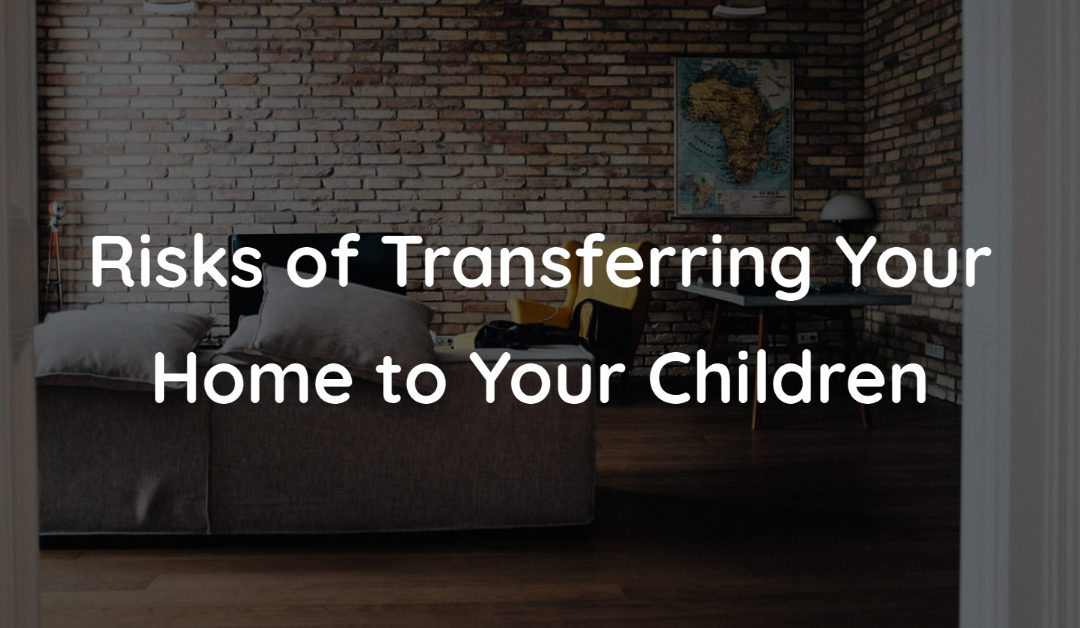It is normal to desire to transfer the title of your home to your children before you pass away, but there are many risks and problems associated with doing so. One thing to consider is that in TX, a legally binding agreement is set in stone once you and your children sign it, whether you filed it at the courthouse or not. So think carefully before making a decision of this kind of importance.
Let’s take a look at some of the complications and issues that can arise from transferring your home to your children so that you can make an informed decision. There are many different ways to file and transfer your property to your children with many different risks involved.
Ways to Transfer Property to Children:
Life Estate Property Deed
With a life estate property deed, you can use your property during your life and it transfers after you die, but you no longer own the property. Your heir owns it and there are many problems associated with this type of arrangement.
- In a life estate agreement, you own an interest in living there. If you and your children choose to sell the house, you could pay capital gains taxes on the amount your house has increased in value over the years. This happens because when you do not live in your house for 2 of the last 5 years, the Federal tax laws remove your “Principle Residence Tax Exclusion.”
- If you arrange a life estate with your child, their share in the house could go to a lienholder who might cause issues for your living arrangement. This can happen if your child owes taxes, goes into bankruptcy, gets a divorce, or is sued. The equity in your home could end up belonging to another lienholder.
- Another issue with a Life Estate is that your children might choose to not make repairs up to your standard. If you decide to move, your children may not agree. Waiting until death to transfer your home enables your rights.
Transfer On Death Deed
In TX, it became legal in 2015 to use a Transfer on Death (TOD) deed which immediately gives the property to whoever you designate. These titles are straightforward and easy to file with the help of your attorney when planning your estate. They can be part of a will.
In a TOD, the property simply moves hands by transferring the name on the deed immediately after your death without having to go through probate. Probate can last months or years depending on how you have set up your estate plan so a TOD is a good way to avoid probate headaches for your children.
Revocable Trust
A Revocable Trust is a type of legal agreement that you keep assets in. It is controlled by the Trustee who manages the assets in the trust. The Trustee can be yourself or someone you trust. You can place your home and other assets into the trust to be managed.
In a Revocable Trust, you name your beneficiaries to inherit along with what and when they will inherit. Taxes are paid by the trust while you’re alive and by the children once you pass. Trusts can be a bit more expensive to set up than simple transfers of ownership but they do give you more control over your assets and how to distribute them between children.
Trusts also enable you to give to children who are not adults yet. Someone can be named as the trustee of your property for a minor child under the age of 18 until they come of age to inherit.
Gift Deed
A gift deed transfers ownership of your property but must be reported by you on your income taxes. If you sign the home over while still living there and are unaware of the tax implications, you and your children might have a problem come tax season.
According to Block Advisors, if you gift property and do not receive anything of value in return, there are tax implications for you. If the value of the gift exceeds the annual combined exclusion amount, you will have to file a gift tax return. It’s not likely that you will owe any gift tax though since the IRS in 2020 sets the gift tax exemption at $15,000 for a single person and $30,000 for a married couple and the estate tax exemption is much higher at 11.58 million. These 2 tax deductions combine to make the annual combined exclusion amount.
Lady Bird Deed
This type of deed lets you stay in your home and have your home transfer to your children after you move into a nursing home. A caregiver child can get ownership after you move to a nursing home. A Ladybird Deed allows you to pass your home on to your children while still obtaining Medicaid coverage when you start to need it.
According to Texas Law Help, “Lady Bird Deeds are often used in long-term care planning. It gives you the right to live in, sell, or mortgage the property while you’re alive and gives the beneficiaries on the deed the right to receive the property (if you still own it) when you die. The transfer is contingent on whether you still own the property.”
Consult a Counselor of Law
It is always best to consult an attorney before making a decision which could have lasting and unfortunate consequences that you may be unaware of. There are many ways that your home changing hands could cause unforeseen taxes or difficulties with probate. With laws changing constantly, it is good to have a knowledgeable counselor helping you understand what is applicable to your situation.



Recent Comments